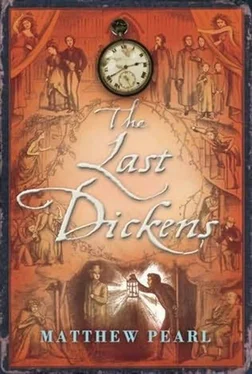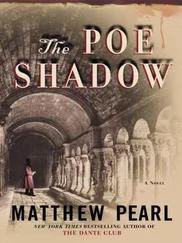The levers didn't look easy to operate and in actuality they were even more difficult than they appeared-Osgood manipulated them into a jerking, halting movement that immediately made him regret his plan. Stopping it was even harder, but Osgood managed to make the machine halt close enough to the fourth floor.
Osgood climbed out of the elevator and dashed to the stairway, where he began to descend before hearing footsteps rising up toward him. It was him! Osgood turned and tried to exit back to the fourth floor but he had lost ground, and Herman was close to grabbing his ankle. The publisher created enough distance to exit on the sixth floor instead. Heaving for breath, Osgood scrambled to the elevator door and pulled the platform lever to call for it from four. Blast that slow steam pump! Please, faster… The elevator arrived and Osgood threw himself bodily inside, smashing his torso hard against the floor.
As the door swung closed, Herman was bearing down on him. Extending his walking stick-the door slammed on it. Osgood, for a long second, found himself eye to eye with the golden face of the Kylin, the lusty horn bursting from its head and its empty onyx eyes. It had been so demonic and chilling. Closer up it lost its power. It seemed a silly gold trinket. Osgood yanked the cane with all his strength by the Kylin's prickly neck. He fell back in the car with it in his hands and the door shut. Osgood kicked at the lever with the toe of his shoe and started the car down.
Osgood hoped he would be far enough ahead (thirty seconds?) of the mercenary that he could get out of the building. But as he listened to the whirring steam below, he thought of the brave Jack Rogers, of foolish Sylvanus Bendall; he thought of poor Daniel on the coroner's cold table; he thought of Yahee's haunting terror; he thought of Wake -field's coldness as he had danced the waltz, of the threats to silence William Trood and Tom; and he thought, too, of Rebecca. Then he knew, without the slightest doubt, that he could not simply run from the building and leave Herman free to find them again. For a moment, Osgood was astonished by his own determination. Herman had to be stopped. He had to be stopped once and for all here.
Osgood passed the first floor. His skills with the lever having improved every moment, he softly brought the car to a stop in the basement. He stepped away from the car to the adjoining engine room where it was controlled and kicked hard without result at the steam pipe that powered the elevator. Then he took the walking stick and pounded it again and again until the valve dented and then broke-the walking stick cracked, decapitating the monstrous golden visage. Osgood returned to the elevator and crouched, waiting, his eyes on the stairwell, his breathing labored and shooting around his fractured ribs, where the dressings underneath his shirt had loosened and ripped and made him feel as though his body would crack in half at any moment. As Herman appeared at the basement door and hurled himself forward, Osgood pulled the door shut and adroitly shot the elevator up at the most reckless speed.
As the car launched into the air, a geyser of steam shot out of the broken engine and sprayed into the charging figure of Herman. Blinded, dazed, the mercenary shrieked and fumbled around in a circle, stumbling into the shaft.
Up above, Osgood panicked. The elevator car was swaying and groaning, its steam power compromised. He abruptly stopped it at the fifth floor, not quite even with the platform, but he tumbled out anyway, grunting in pain as he made contact with the wood floor. Just then, the chains unraveled and the empty car rushed down as though in a dead faint. Herman, curled up in a stupor in the shaft and trying to crawl away from the burning steam, looked above him just long enough to see the car before it smashed onto him. The force was so great that the hulking form of the mercenary's body broke through the floor of the elevator car, as the chandelier and the skylights shook free and rained a thousand shards into him.
BOTH DIZZY AND profoundly awake, Osgood rose to his feet, looking down the elevator's shaft. An explosion left a layer of flames at the bottom. He was tucking away his satchel, when he was grabbed by the shoulders.
“No!” Osgood screamed.
“Halloa! Are you well, man?”
It was the scraggly, messy-bearded man Osgood had seen at the bottom of the building, the beard now apparent as a rusted red color.
“You looked to be under some distress at the door,” the man continued, his hands groping at Osgood's shoulders, arms, and around the satchel as though to check for wounds.
“I must send for the police,” Osgood said. “There's a man injured down there-”
“Already done!” the man with the overgrown beard cried. “Already sent for, my dear man. Though not much of that fellow down there is left, by the looks of it. Elevators! Why, I won't get in one myself, not with those demonstrations at the fairs killing one or two passengers at a time, and on a good day. They should be abolished, says I. Now, how can I help you? I have a wagon out front. Where can I take you?”
Was the rust-colored bearded man another janitor? Then the publisher realized: This stranger matched the description of Molasses, he of the rainbow-colored beard who operated among the notorious Bookaneers and claimed the fame of having secured Thackery's The Adventures of Philip before the world.
“Hand it here,” said Molasses, a change passing over his face as he caught the glint of Osgood's recognition. “Don't know what you have there exactly, but the Major would probably pay triple for whatever it is. And you're in no shape for a tussle, not tonight.”
Little does he know what Harper would pay! thought Osgood. He knew there were no police coming, at least not by this man's doing.
There was a moan from far below them. Another explosion came from the engine room, and the flames shot another floor higher. Osgood realized from the dampness of his flesh that the heat was closer. Soon the gas line that had lighted the elevator car would burst open and the whole place and everything inside it would be roasted.
As Osgood backed away toward the elevator shaft, he noticed Molasses's face suddenly turn fearful. The literary pirate's hands raised slowly. Osgood whirled around and saw Wakefield coming from the stairwell. He was pulling Rebecca by her arm and had a pistol to her neck. Her arms and face were bruised, her dress torn in multiple places.
“Rebecca!” Osgood exclaimed in shock.
“I am afraid your dead hero's hired hackman went a little wild from all the commotion, Osgood,” Wakefield said. “The carriage tipped over, but don't fear-I was there to come to your damsel's aid, just as I have yours so many times now.”
“Let her be, Wakefield!” Osgood cried, then quickly added, as calmly as possible: “You can still get down there. There is still time to save him. ”
Wakefield peered down at the flames lapping the darkness from six floors below, where the broken body of Herman struggled. “Doubtful he'd survive that, I'd say, Osgood. There are plenty of other fire worshippers that would serve me for a profit.”
“He is your friend,” Osgood said.
“He is a cog in my enterprise, as your search has been. Now, I shall tell you what I'd like. You drop that satchel down into those flames, and I'll allow your silly girl to live.”
“Don't, James!” Rebecca cried. “Not after all that has happened!”
Osgood mouthed to her that it was all right and smiled reassuringly. He held the satchel out over the shaft.
“Very good move, my boy. You can take orders after all.” Wakefield smiled. “Don't worry, Mr. Osgood, the world will not be deprived of Dickens's ending.”
Читать дальше












